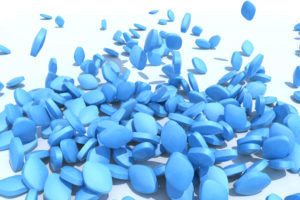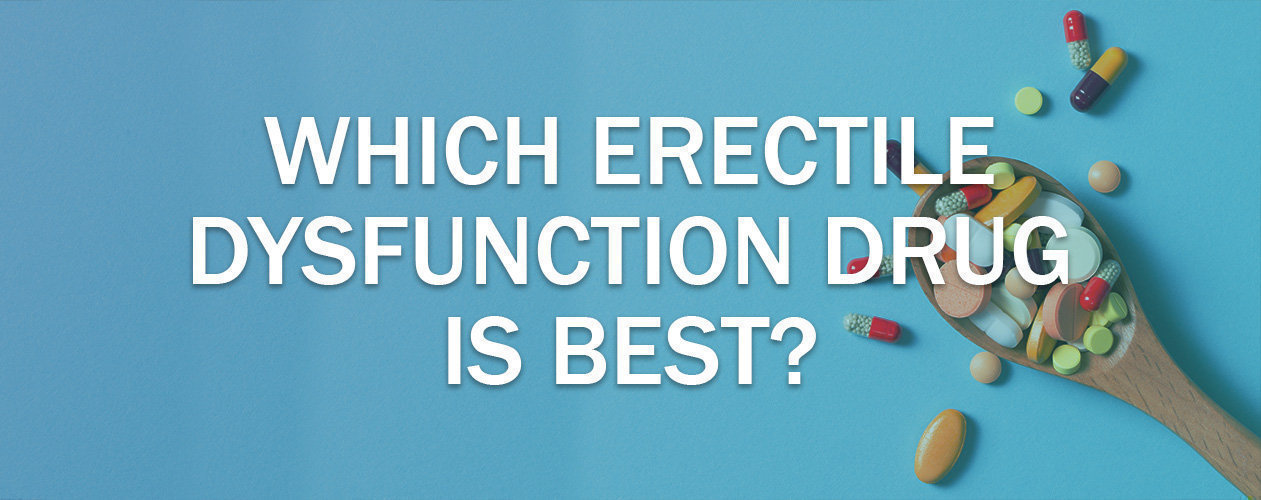Which erectile dysfunction drug is best?
Background
In this modern era, selective phosphodiesterase type 5 inhibitors are the mainstay of treatment for erectile dysfunction. These medications are highly efficacious, are well tolerated, and have favourable safety profiles.
But you can’t take an erectile dysfunction drug and expect to get an erection right away.
These medications boost the effects of a chemical your body makes called nitric oxide, which relaxes the muscles in your penis. That improves your blood flow and helps you get an erection.
For the drugs to work, you need to be sexually aroused. So, don’t rush things. Take some time to get into the mood. Use all your senses to get turned on.

About erectile dysfunction
The International Society for Sexual Medicine defines erectile dysfunction as a man’s inability to achieve or maintain an erection suitable for satisfactory sex. In order to understand erectile dysfunction, it is important to understand how erections occur. When a man is sexually aroused, nerves and chemicals work together to relax smooth muscle tissue and widen arteries so that the penis can fill with blood. Veins constrict to keep the blood inside the penis, forming the erection. Once the man ejaculates, the blood is released back into the body.
Erectile dysfunction becomes more common as men get older. It is also associated with some medical conditions, like heart disease and diabetes. In fact, an estimated 50% of diabetic men have some degree of erectile dysfunction.
Erectile dysfunction risk factors
- Smoking: It increases your risk of hardening of the arteries. This reduces blood flow to the penis. It’s that blood flow that helps you get an erection;
- Being overweight: Carrying extra pounds increases your risk of blood vessel disease, a cause of erectile dysfunction;
- Inactive lifestyle: If you want to reduce your chance of getting erectile dysfunction, get off the couch. Regular exercise can help to make sure that when the time comes, you’re ready;
- Poorly managed diabetes: Diabetes can affect blood flow to your penis. Maintain a healthy diet, get regular exercise, and take your medicine as prescribed;
- High cholesterol: It can damage the linings of blood vessels, including those in the penis. It can also affect the arteries leading to your genitals. Eat right, exercise regularly, and take your meds;
- Alcohol: If you have more than two drinks a day, you could be hurting your ability to get an erection. Alcohol restricts blood flow to the penis and can hinder the production of testosterone. Low testosterone can affect not only your performance but your desire, too;
- Illegal drug use: Marijuana, cocaine, and other recreational drugs can cause erectile dysfunction by damaging blood vessels. They can also restrict blood flow to the penis;
- Stress and anxiety: These are the leading causes of temporary erectile dysfunction. If your mind’s too occupied, it’s hard to relax enough to be “in the mood”.
The incidence of erectile dysfunction
The incidence of erectile dysfunction increases with increasing age. Men aged 18-59 years have an incidence of erectile dysfunction of 10%. Other data looking at similar groups divided the age groups into 10-year sections and found that, by setting individuals aged 18-29 years as a reference group, individuals aged 50-59 years had a 3.5 times higher incidence of erectile dysfunction. Another survey found that males older than 70 years had a 61% incidence of erectile dysfunction.
Erectile dysfunction treatment options
- Psycho-sexual treatments. These approaches may reduce both the man’s and his partner’s anxiety, enhance arousal, and offer pleasurable options, which may reduce the man’s stress;
- Oral medications. Phosphodiesterase type 5 (PDE5) inhibitors help increase blood flow to the penis. These drugs are usually the first method patients try, but they should not be used by men who take nitrates;
- Penile injections. Men can learn to inject medication into the penis. This medication helps blood vessels dilate, allowing more blood for erection;
- Urethral suppositories. These medications are inserted into the urethra at the tip of the penis;
- Vacuum erection devices. The man places his penis into a vacuum cylinder and pumps air out. He then places a constriction ring at the base of the penis, which keeps the erection;
- Penile implants. Implants are surgically placed inside the penis and allow a man to get an erection when he wishes.

Which erectile dysfunction drug is best?
The current four oral erectile dysfunction drugs all belong to the same drug class; that is, phosphodiesterase type 5 inhibitors, or PDE-5. The drug options include sildenafil (Viagra), tadalafil (Cialis), avanafil (Stendra) and vardenafil (Levitra).
Research has shown that these PDE-5 inhibitors are similar when it comes to efficacy and safety, but there are some differences regarding timings to consume, the impact of diet on how well they are absorbed, how long they last, and some minor side effects.
These factors play a significant role in helping men decide which erectile dysfunction drug is best for their needs and lifestyle. Men also may take into consideration their and their partners’ preferences, such as how spontaneous they are when it comes to sexual activity, and cost.
In 2011 a meta-analysis compared the use of three erectile dysfunction drugs–sildenafil, tadalafil, and vardenafil, among more than 7,700 men. The investigators found that men consistently preferred tadalafil (Cialis) (52-65%) over the other two (12-20% for vardenafil; 8-30% for sildenafil). Although all three drugs were shown to be safe and effective, tadalafil offered men a 36-hour window of opportunity for getting an erection, while the other two provided a much shorter time period.
But if you want, you can compare the general characteristics of erectile dysfunctions drugs. These facts, along with your personal preferences and lifestyle habits, can help when choosing which erectile dysfunction drug is best for you.
Viagra (Sildenafil)
- Begins to work within 30 to 45 minutes of ingestion;
- You can achieve successful erections for 2 to 3 hours, although the effects may last up to 5 hours at a higher dose;
- The recommended dose for most men is 50mg; after that, dosage may go to as high as 100mg, or as low as 25mg, which may be prescribed for men over 65;
- It is quickly absorbed by the body but less effective after a high-fat meal, and best taken on an empty stomach;
- Most common side effects are abnormal vision (blue-tinged vision, blurriness), back pain, dizziness, flushing, headache, muscle pain, nausea, rash, stuffy or a runny nose, and upset stomach. Rare effects include irregular heartbeat and stroke.
Levitra (Vardenafil)
- Begins to work within 25 minutes, but it may take longer if you take it with a fatty meal;
- You can achieve successful erections for 4 to 5 hours after taking the pill;
- Starting dose for most men is 10mg a day, but men over 65 often start on the 5mg pill;
- Can be taken with or without food, although slightly less effective after a high-fat meal. Avoid anything containing grapefruit juice; it may make side effects worse;
- Most common side effects are a headache and facial flushing. Less common side effects include blue-tinged vision, dizziness, indigestion, nasal congestion, and nausea.
Cialis (Tadalafil)
- Begins to work within 30 to 45 minutes after ingestion, although there have been reports that it can be effective within 15 minutes;
- You can achieve successful erections for up to 36 hours after taking the pill;
- Comes in two forms. The daily pill stays effective in between doses but may take 4 to 5 days before it begins working. The “weekender” version of Cialis can start working in as little as 30 minutes for men who take the highest dose of the drug (20mgs); it stays effective in the body for up for 36 hours;
- The daily pill comes in both a 2.5mg and 5mg tablet; most men start with the lower dose. The use-as-needed, “weekender” pill comes in 5, 10 and 20mg strengths; recommended starting dose is 10mg;
- Can be taken with or without food. Avoid heavy drinking (5 glasses of wine or five shots of whiskey); when combined with Cialis, it can lead to headaches, dizziness, an increase in heart rate, and a drop in blood pressure;
- Most common side effects are a headache and indigestion. Less often men experience back pain, dizziness, facial flushing, muscle aches, and nasal congestion;
- Integrated analysis of data from phase III trials demonstrated that tadalafil, at doses from 5 mg to 20 mg versus placebo, significantly improved erectile function (EF) by all measures. 50%–65% of patients, regardless of erectile dysfunction severity at baseline, returned to normal EF with almost 60%–90% of success rate at intercourse attempts during active treatment.
Spedra (Avanafil)
- Prescribing information now recommends taking it 30 minutes before sex. Some men, however, report results in as little as 10 to 12 minutes, depending on the dose;
- You can achieve successful erections for more than six hours after taking the pill;
- The starting dose is 100mg for most men, but the 50mg tablet is recommended for men taking alpha-blocker drugs, like those used for high blood pressure and prostate problems;
- May be taken with or without food, and with a moderate amount of alcohol (3 drinks). Drinking more than that can increase the chances of side effects like rapid heart rate, low blood pressure, dizziness and headaches;
- Most common side effects are flushing, headache, nasal congestion, and runny nose. Symptoms such as back pain, diarrhoea, dizziness, hypertension, influenza, muscle aches, and upper respiratory infections are less common.;
- The percentages of successful intercourse attempt after taking each dose were as follows:
- The 50 mg dose had a 47% success rate;
- The 100 mg dose had a 58% success rate;
- The 200 mg dose had a 59% success rate.
Sildenafil and vardenafil bind to cGMP, thereby blocking the PDE-5-mediated catalytic mechanism that dephosphorylates and breaks down cGMP. In contrast, tadalafil is structurally distinct from sildenafil and vardenafil and may inhibit PDE-5 by a slightly different mechanism. Selectivity for the different PDEs varies among these three agents. Vardenafil has the highest selectivity for PDE-5. Subtle pharmacokinetic differences in PDE-5 inhibitors may influence clinical use, yet efficacy is likely to be very similar among these drugs. The efficacy of PDE-5 inhibitors varies from 40% to 85% depending on the severity and aetiology of erectile dysfunction.
The ideal therapy for erectile dysfunction should reverse or reduce the processes leading to corpus cavernosal smooth muscle dysfunction or lack of cavernous nerve activity. Erectile dysfunction is often due to the inability of the cavernous smooth muscle to relax. Events that prevent relaxation include nerve damage, endothelial dysfunction, or alterations in receptors or signal transduction pathways in cavernous smooth muscle. In general, patients with erectile dysfunction respond well to pharmacologic therapies. Only 10%–15% of men with erectile dysfunction fail to respond to currently available drugs.
How well do erectile dysfunction pills work?
Erectile dysfunction drugs produce an erection enough for intercourse in about 70% of men. But the results vary quite a bit from one individual to another. A man with nerves or arteries damaged by prostate surgery, diabetes, or cardiovascular disease will have a different response to erectile dysfunction drugs.
What precautions should I take?
Before you take any of the other erectile dysfunction drugs, you should tell your healthcare provider about all medications and supplements you are taking, both prescription and over-the-counter. This is especially critical if you are taking nitrates because the combination can cause a drastic and sudden drop in blood pressure. You should also tell your doctor if you have ever had the following:
- Heart problems, such as heart attack, angina, heart failure, irregular heartbeat;
- Heart surgery within the last 6 months;
- Stroke;
- Low or high blood pressure;
- Peyronie’s disease;
- Priapism;
- Blood disease, such as multiple myeloma, leukaemia, sickle cell anaemia;
- Retinitis pigmentosa (a genetic eye disease);
- Bleeding problems;
- Stomach ulcers;
- Liver problems;
- Severe vision loss;
- Kidney problems;
- Any other medical conditions.
Drug interactions
Each drug comes with the chance of drug interactions. Since PDE-5 inhibitors work on the body in similar ways, Cialis, Levitra, and Viagra come with similar interactions.
All three of these drugs interact with nitrates. They also all interact with blood pressure drugs such as alpha-blockers. For Cialis, these also include the drugs enalapril and metoprolol. For Viagra, these also include the blood pressure drug amlodipine.
Viagra also interacts with the drug ritonavir.
Cialis can also interact with alcohol. Drinking alcohol with Cialis can cause low blood pressure when you stand up from a sitting or lying position. This may result in dizziness or a headache. Levitra and Viagra do not seem to cause low blood pressure when taken with alcohol. However, alcohol may interfere with your ability to get an erection, even while you’re taking any of these drugs.
Getting the most from your treatment
- You and your partner will still act just as you would if you were not taking a medicine for erectile dysfunction;
- Do not drink large amounts of alcohol before you plan to take an erectile dysfunction drug. Drinking too much alcohol can reduce your ability to get an erection and this may prevent you from getting the maximum benefit from the tablets;
- It is recommended that you do not drink grapefruit juice during the 24 hours before you take an erectile dysfunction drug. This is because there is a chemical in grapefruit juice which can increase the amount of avanafil in your bloodstream and this makes side effects more likely;
- Keep your regular appointments with your doctor so your progress can be monitored. If you feel the tablets are too strong for you, discuss this with your doctor as your dose may need to be reduced. Alternatively, if you do not get an erection after taking an erectile dysfunction drug, or if it does not last long enough for you to have sex, you should discuss this with your doctor; do not take more tablets than you have been told to.

Closing thoughts
If you have erectile dysfunction, talk to your doctor about Cialis, Spedra, Levitra, and Viagra. Tell your doctor if you take other over-the-counter or prescription drugs or supplements. Be sure to mention all other health conditions you have.
Different erectile dysfunction drugs suit different people, but it is difficult to tell which one will be best for you until you have tried them all. While an erectile dysfunction drug may not work for you first time around, it is recommended to take it at least eight times before giving up and trying another. This is because it can often take this long to determine whether a drug is right for you.
Each of these three popular drugs has been shown to help men with erectile dysfunction when they’re used correctly. These drugs have good results, but it may take a little time and patience to get it right. If one drug doesn’t work or produces unpleasant side effects, you can try another drug. It may also take some time to find the dosage that works best for you.
References
- https://www.issm.info/sexual-health-qa/what-is-erectile-dysfunction1/;
- https://www.webmd.com/erectile-dysfunction/guide/lifestyle-factors-linked-to-ed;
- Eardley I. The Incidence, Prevalence, and Natural History of Erectile Dysfunction.
Sex Med Rev. 2013 May;1(1):3-16. Epub 2015 Oct 21. PubMed PMID: 27784558. DOI: 10.1002/smrj.2; - https://prostate.net/articles/which-ed-drug-is-best;
- Giovanni Vanni Frajese, Flavio Pozzi, Gaetano Frajese. Tadalafil in the treatment of erectile dysfunction; an overview of the clinical evidence. Clin Interv Aging. 2006 Dec; 1(4): 439–449. PMCID: PMC2699638. PubMed PMID: 18046921;
- https://www.ema.europa.eu/documents/product-information/spedra-epar-product-information_en.pdf;
- McCullough AR, Siegel RL, Shpilsky AB. Intercourse success rates with sildenafil citrate. J Urol. 2001;165(suppl):170;
- Purvis K, Egdetveit I, Christiansen E. Intracavernosal therapy for erectile failure–impact of treatment and reasons for drop-out and dissatisfaction. Int J Impot Res. 1999 Oct; 11(5):287-99. PubMed PMID: 10553808;
- https://www.health.harvard.edu/mens-health/which-drug-for-erectile-dysfunction;
- https://prostate.net/articles/stendra-compared-to-viagra-cialis;
- https://www.healthline.com/health/erectile-dysfunction/cialis-levitra-viagra#drug-interactions.

